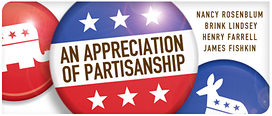In principle, I’m happy to see that James Fishkin has found some common ground between advocates of deliberation and advocates of partisanship. This is a significant shift on his part — much of his previous work is not, to put it mildly, laudatory of partisans and partisanship. But in many ways I’m not. I’m not at all convinced that there is a real meeting of minds here, and wonder whether continued strong disagreement mightn’t be more intellectually useful. [1]
Fishkin likes deliberation because he believes that it will allow us to find common ground regarding our shared needs and interests, and thus reach collective agreement. He believes that this common ground has been obscured by modern political consultants who are able to manipulate public debate and manufacture dissensus. Thus his claim that if people engage in collective deliberation and deliberative polls, they might indeed be able to engage in “collective will formation in the public interest” that would benefit the common weal.
But if you really buy this vision of politics (as I’ll explain later, I don’t), then you probably shouldn’t like partisanship. Even if an idealized form of partisanship can be extricated from bad television debates, push-polls and the like, it inevitably produces sharp — and potentially irresolvable cleavages. Partisanship — even in its most laudable form — is associated with forms of politics that are fundamentally riven by conflict and competition. For partisans, stark political differences aren’t the artificial product of political manipulation (even if they can perhaps be exacerbated by it). Instead they are an integral part of politics. The room for common ground and collective will formation is at best highly limited.
Rosenblum’s account of partisanship fits much better, I think, into an agonistic account of politics than a consensual one. Her partisan virtue of accommodationism is a limited one — partisans want to do more than win, but they are nonetheless engaged in a contest with partisans of the other side for votes and for the assent of the majority. Her vision of politics is one in which there are clear winners and losers.
This fits much better, I think, into an understanding of politics as a space where reasonable agreement may very often be impossible to reach. People with clashing values, ideals, and interests may simply be incapable of coming to terms. There may not be a collective will or identifiable public interest out there in the sense that Fishkin implies.
More generally, deliberation theorists get a lot of flak for making ambitious claims about the likelihood that deliberation will produce agreement. Some versions of deliberation theory are (in my view) more realistic. Jack Knight and Jim Johnson, for example, have a forthcoming book where they argue that deliberation will often serve to sharpen disagreement rather than to create consensus, but that it is nonetheless valuable for that. This more limited account of deliberation theory seems to me to be quite compatible with partisanship as Rosenblum explains it. But I am not at all sure that Fishkin’s much more expansive account is compatible in the same way.
[1] Indeed, the normative argument I’m making implies that sharp disagreement will often be more useful than fuzzy disagreement.

